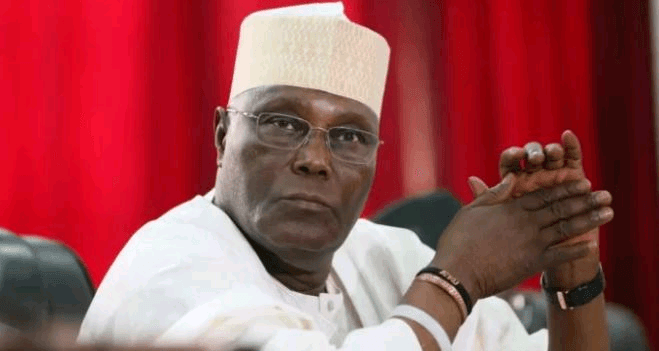By Hussaini Ibrahim Sulaiman
Former Vice President and presidential candidate, Atiku Abubakar, has raised significant concerns over the 2025 federal budget, arguing that it fails to provide the necessary fiscal framework to address Nigeria’s long-standing structural challenges.
According to Atiku, the budget falls short of addressing critical economic issues, perpetuating the same policies that have hindered Nigeria’s progress in recent years.
The N48 trillion budget, which includes a N35 trillion revenue forecast, carries a deficit of over N13 trillion, representing 4% of Nigeria’s Gross Domestic Product (GDP). This growing fiscal imbalance, Atiku argued, is a clear indication of the administration’s continued reliance on borrowing to meet its financial obligations.
In his assessment, Atiku highlighted a troubling trend of fiscal mismanagement under the current administration, particularly in its over-reliance on borrowing and its failure to foster sustainable economic growth. He contended that the 2025 budget would only exacerbate the country’s economic challenges rather than provide viable solutions.
In a statement released to the press, Atiku Abubakar described the 2025 budget as a continuation of “business-as-usual” practices, which starkly contrasts with the urgent need for structural reforms in the nation’s economy.
He pointed to the government’s planned new borrowings totaling over N13 trillion—split between N9 trillion in direct borrowings and N4 trillion in project-specific loans—as an indication of the administration’s persistent dependence on external debt to bridge its fiscal gap.
“This approach mirrors that of previous administrations, resulting in escalating public debt and exposing Nigeria to greater risks related to interest payments and foreign exchange volatility,” Atiku noted.
He emphasized that excessive borrowing would not only burden future generations but also undermine Nigeria’s economic sovereignty in the long term.
Atiku then outlined several key issues within the 2025 budget that, in his view, would hinder the nation’s ability to achieve meaningful economic transformation:
Atiku pointed to the underperformance of the 2024 budget, which saw less than 35% of the allocated capital expenditure for Ministries, Departments, and Agencies (MDAs) disbursed by the third quarter, despite claims of 85% budget execution.
This persistent underperformance in capital spending—which is crucial for economic growth—casts serious doubt on the government’s ability to effectively execute the 2025 budget. Consequently, Atiku questioned the government’s commitment to improving the country’s infrastructure and driving development.
The 2025 budget allocates a staggering N15.8 trillion (33% of total expenditure) to debt servicing, which is nearly equal to the planned capital expenditure of N16 trillion (34%).
Atiku highlighted that debt servicing now surpasses spending on critical sectors such as defense (N4.91 trillion), infrastructure (N4.06 trillion), education (N3.52 trillion), and health (N2.4 trillion). This significant imbalance, he argued, will crowd out essential investments in these sectors, ultimately undermining Nigeria’s development and long-term stability.
Moreover, the recurrent expenditure, which stands at over N14 trillion—approximately 30% of the total budget—remains disproportionately high, largely due to an oversized bureaucracy and inefficient public enterprises.
Atiku criticized the government’s failure to introduce meaningful reforms aimed at reducing waste and improving the efficiency of public operations. This, he warned, will only exacerbate Nigeria’s fiscal challenges, leaving less room for investments in critical development projects.
After accounting for debt servicing and recurrent expenditures, Atiku noted that the remaining allocation for capital spending is woefully insufficient. With only 25% to 34% of the budget earmarked for capital projects, the average allocation per capita is approximately N80,000 (about $45).
This, Atiku argued, is far below what is required to address the nation’s infrastructure deficit and stimulate sustainable economic growth. He warned that without sufficient capital investment, Nigeria will struggle to address its growing infrastructure needs and create jobs for its expanding population.
Atiku also criticized the administration’s decision to increase the Value Added Tax (VAT) rate from 7.5% to 10%. According to him, this tax hike will only deepen the economic hardships faced by Nigerians, particularly the most vulnerable.
“The increase in VAT is a retrogressive measure that will further squeeze the already struggling populace,” he said. He further warned that such policies, combined with the government’s failure to address inefficiencies, will likely stifle domestic consumption and worsen the economic downturn.
